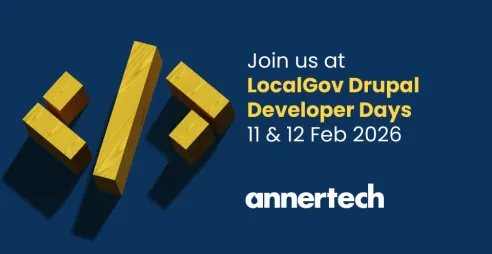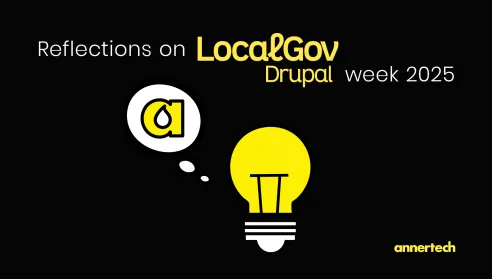What makes LocalGov Drupal the ideal CMS for UK and Irish councils

As councils across the UK and Ireland face growing pressures from Local Government Reorganisation and the rise of AI-driven digital services, the need for flexible, cost-effective, and future-proof website platforms has never been greater.
As both local government structure and available technologies dramatically shift the requirements of councils for their websites, a quiet revolution has already been taking place. LocalGov Drupal (LGD), an open-source solution built collaboratively by councils for councils, is rapidly emerging as the preferred choice.
LGD, now adopted by 58 councils at the time of writing and counting, is uniquely placed to meet these changing requirements. Built on leading open source software by councils for councils, LGD delivers a raft of tangible benefits with dedicated features and typical cost savings for new council websites of at least half and as much as 80%.
Here we look at some of those strengths that are driving adoption of LocalGov Drupal across the UK and Ireland.
Real solutions are at the heart of everything in LocalGov Drupal
Traditionally, councils have individually commissioned bespoke solutions for their website. These are pricey endeavours, and LocalGov Drupal has firmly established itself as a cost-efficient solution. But saving money isn’t the only advantage of LocalGov Drupal.
As councils face similar challenges with their digital estate, from accessibility compliance to information architecture and driving engagement, it makes perfect sense to come together to face these challenges.
This is where LocalGov Drupal shines: the collaboration between the community of council teams and technology experts like Annertech to tailor solutions for real world scenarios, all backed with the powerful features of Drupal under the hood.
This ultimately drives better experiences for council teams and residents alike.
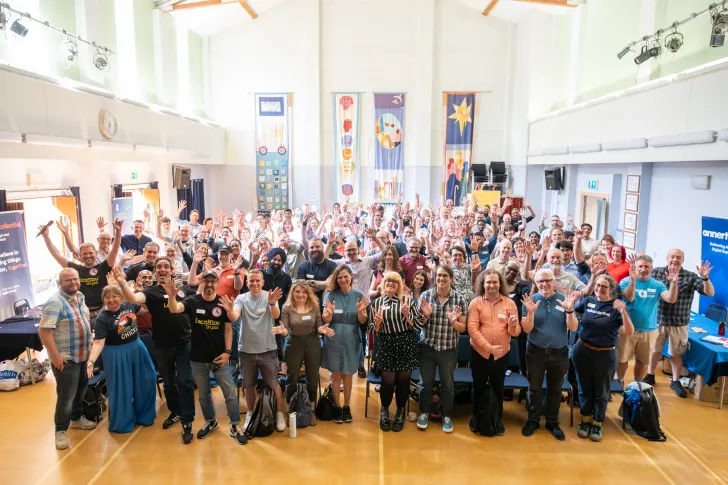
Dedicated features
LocalGov Drupal is purpose built by councils for councils. That means the features have been designed, road tested and continuously improved in the wild on real council websites.
The platform includes pre-configured content types that reflect how councils actually organise information:
- Landing pages and child pages are structured so that topics are easy to reach and explore.
- Guides and ‘Step by steps’ make more complex information digestible.
- News, banners and alert systems for timely communication
- Events to provide information on what’s on.
- Directories for finding local services and contacts.
- HTML publications to publish documents in an accessible and easy to digest format.
The extensive component library provides the building blocks to build out the various types of content, including call outs to highlight important information, accordions to provide interactive information, media components for publishing images to landing pages and video content to accompany news articles.
Integral to the library are components specifically designed for council use cases, such as alert banners, service status indicators and even components that Annertech developed specifically for Irish councils in a standard format such as Meeting Minutes and the Irish Service Catalogue.
If this extensive feature set wasn’t impressive enough, where LocalGov Drupal really excels in this department is that each of these components can be extended and customised to enhance, personalise and meet individual council requirements where needed.
In addition, the LocalGov Drupal Microsites platform offers a subset of LocalGov features combined with tools for creating and managing a fleet of smaller websites from a single codebase, resulting in both consistency within the digital estate and further efficiencies.
Scale smarter with LocalGov Drupal microsites
Why reinvent the wheel for every department, service, event or initiative? With LocalGov Drupal Microsites, you can launch new sites quickly, manage them all from one place, and keep costs under control — all while giving editors the flexibility they need. It’s the fast, secure, and scalable way to expand your council’s digital presence.
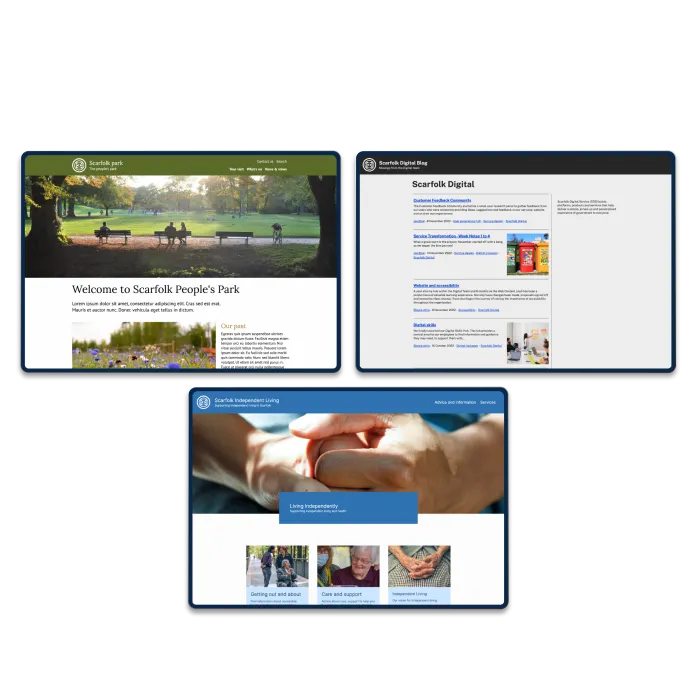
Design and accessibility: Tried and tested patterns
End-user experience is at the heart of everything that we do at Annertech and one of the fundamental strengths of LocalGov Drupal is that nothing has been left to chance when it comes to interaction design patterns.
At its foundation, LocalGov Drupal builds on the GOV.UK Design System. The Design System represents a depth of user and accessibility research and testing. It provides detailed guidance for building out and using components, many of which are adopted by LocalGov Drupal.
Annertech builds on that foundation to tailor the Design System for council websites. Digital expertise is combined with local government experience in the form of designers, architects, frontend specialists and accessibility experts, who help us to meet the highest standards for each and every website that we build for our councils.
For example, the project benefits from a dedicated Accessibility Governance Group, including Annertechie Tom Bamford. This group regularly audits, tests and discusses the accessibility of LocalGov Drupal features and components, steering the delivery of improvements to the product from an accessibility point of view and reviewing new features to ensure an accessibility-first approach.
Each and every new website and feature that we build in LocalGov Drupal strengthens the LGD product further, as we meet new design challenges and reinforce upstream code.
Drupal publishing tuned for councils
The editor experience in LocalGov Drupal builds on Drupal’s best in class content management tools so that council teams can intuitively create and publish content.
Layout paragraphs provides a drag and drop interface for building out components on landing pages, CKEditor provides a ‘What you see is what you get’ editor that feels intuitive for crafting content, while LocalGov Drupal provides a custom drag-and-drop reference tool to rapidly add service page structures.
Drupal’s powerful roles and permissions, content publishing, moderation and revisions systems are configured out of the box in LocalGov Drupal to provide sensible defaults that match common council governance structures.
At Annertech we have the requisite expertise and experience to mould the system so that council web team members can safely perform content actions appropriate to their department and roles with multi-level approval workflows and oversight from web team managers. We can build on the out-of-the-box features and extend them with modules like ‘Content access by path’ for contextual permissions, and ‘Security Kit’ for Content Security Policy.
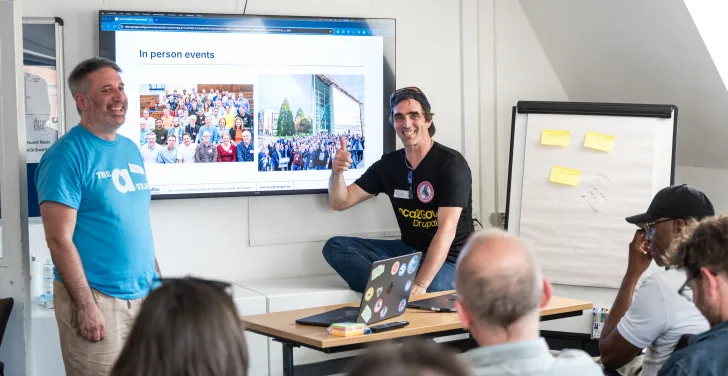
Collective knowledge and community support
With Drupal just a few months away from its 25th birthday, there’s no doubt that at the heart of its success is its community and collaboration. LocalGov Drupal was founded on the same principles and nothing can beat the collective knowledge and experiences of over 50 councils working together alongside technical experts in the LocalGov Drupal community.
LocalGov Drupal takes the community principle and runs with it. People regularly come together using a variety of mediums:
- The Slack group, for electronic discussion and support
- Structured collaboration through regular online drop ins, meet ups and groups tailored for a variety of disciplines.
- In-person meetings and events like LocalGov Camp, LocalGov Connect events and ad hoc local meetings
- Github and Drupal.org to work on specific technical issues and features
The Luma channel is the place to find a sample of those regular drop-ins, meetings and groups.
Members of our LGD team at Annertech participate in weekly groups and monitor Slack channels on a daily basis to offer technical support to people of all experience levels, and we learn too from shared experiences and peer review of our work.
Innovation: AI capabilities and feature development
LocalGov Drupal never stands still and underpinning its future, Drupal never stands still either.
The LocalGov Drupal innovation roadmap is driven by council needs and web best practices rather than technology trends, ensuring that new and improved features are genuine enhancements.
Drupal is positioned at the very forefront of digital innovation for local government, with AI capabilities already emerging through the Drupal AI Initiative where Annertech is playing a leading role in the development of the AI media track.
As the future is shaped, the fundamental values that are driving user interaction design coupled with the governance structures already in place will also play an important part in how AI is shaped in LocalGov Drupal, with human oversight to ensure integrity, quality and respect for privacy.
In summary
LocalGov Drupal represents something unique. By working together, councils are creating services that none could achieve alone and the product is strengthened further as adoption grows.
For councils evaluating their content management options, LocalGov Drupal offers even more than a dedicated and feature rich content management system – it offers membership of a community dedicated to serving all residents by making information more accessible and tasks simpler to accomplish.
Ready to take LocalGov Drupal for a spin and discuss requirements for your council website?


